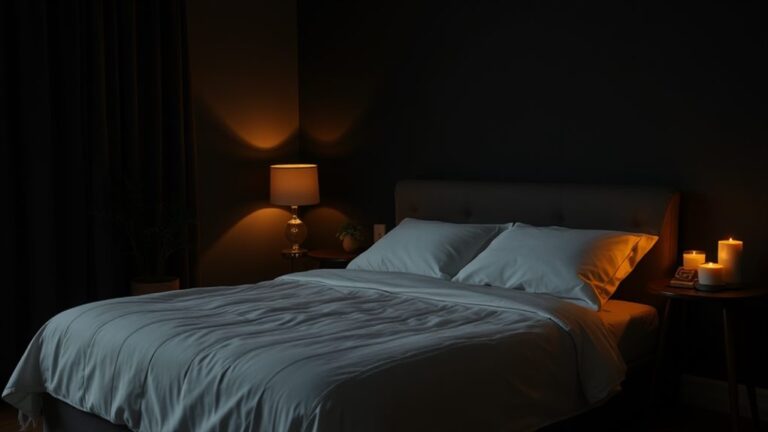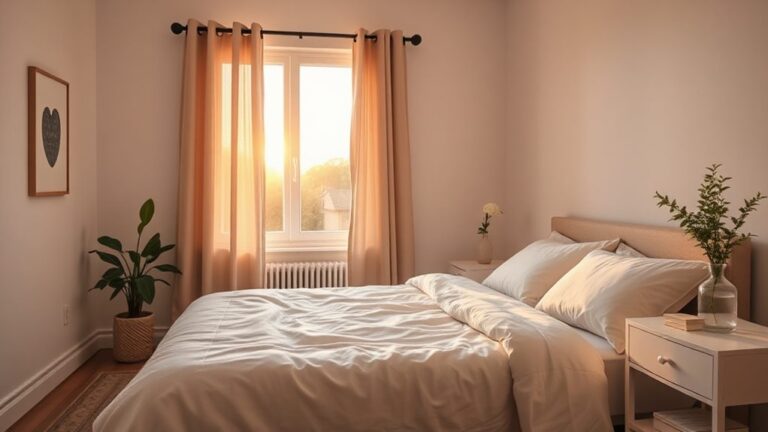To overcome insomnia, start by establishing a consistent sleep schedule and creating a sleep-conducive environment. Dim the lights and electronics, and practice gentle stretching exercises to calm your mind and release physical tension. Take a warm bath or shower, and listen to calming music to unwind. Avoid stimulating activities and limit screen time before bed, instead opting for a book or journal to signal to your brain that it's time to sleep. By incorporating these habits into your bedtime routine, you'll be on your way to improving the quality of your sleep – and discovering even more ways to wake up feeling refreshed.
Nightcap Notes
- Establish a consistent sleep schedule to regulate your body's internal clock and improve sleep quality.
- Create a sleep-conducive environment by dimming lights, reducing noise, and maintaining a comfortable temperature.
- Practice relaxation techniques, such as gentle stretching, aromatherapy, or listening to calming music, to calm your mind and body.
- Limit screen time before bed and replace it with relaxing activities, such as reading or journaling, to reduce mental stimulation.
- Develop a calming pre-sleep routine, such as soaking in a warm bath or taking a relaxing shower, to signal your body that it's time to sleep.
Set a Consistent Sleep Schedule
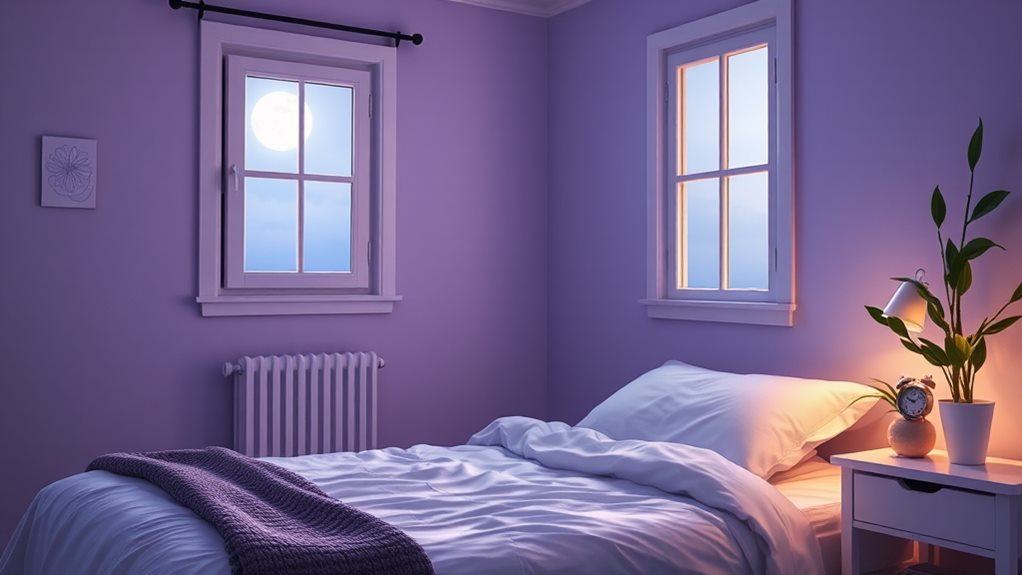
Establishing a consistent sleep schedule is key to developing a relaxing bedtime routine. You go to bed and wake up at the same time every day, including weekends. This helps regulate your body's internal clock, making it easier to fall asleep and stay asleep.
By setting a consistent sleep schedule, you're training your body to follow a regular sleep-wake cycle, which can improve the quality of your sleep. A well-planned bedtime routine can also involve creating a sleep-conducive environment, such as using products like those found on Slumber Success. Additionally, a consistent sleep schedule can help reduce stress and anxiety, making it easier to wind down before bed.
You start by setting a realistic bedtime and wake-up time, taking into account your lifestyle and daily routine. If you're not a morning person, don't try to wake up at 5 am if you're not used to it.
Instead, set a wake-up time that works for you, and adjust your bedtime accordingly. Stick to your schedule, even on weekends or days off, to maintain consistency. Consistency is crucial to developing a relaxing bedtime routine, and vital to establish a sleep schedule that works for you.
Dim the Lights and Electronics
How often do you find yourself scrolling through your phone or watching TV right before bed?
This habit can actually interfere with your sleep. The blue light emitted from screens can suppress melatonin production, making it harder to fall asleep.
A calming environment, complete with soothing paint colors, can promote a restful night's sleep – consider incorporating Calming Colors into your bedroom design.
It's time to dim the lights and electronics to create a sleep-conducive environment.
You can start by establishing a pre-bedtime routine that involves disconnecting from screens.
Try these simple steps:
- Set a screen-free period: Allocate at least an hour before bedtime as a screen-free period. Use this time to relax, read, or meditate.
- Use blue light filtering glasses or apps: If you must use your phone or computer before bed, consider using blue light filtering glasses or apps that filter out the sleep-disrupting wavelengths.
- Dim the lights: Gradually dim the lights in your home to signal to your body that it's time to sleep. This will help regulate your circadian rhythms and prepare your body for a restful night's sleep.
Practice Gentle Stretching Exercises
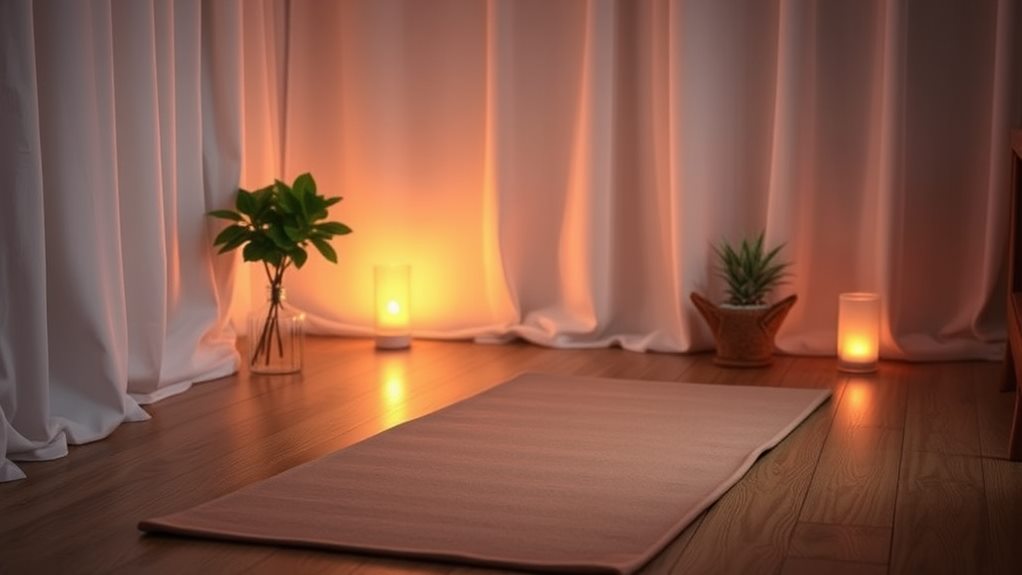
Now that you've created a sleep-conducive environment by dimming the lights and electronics, it's time to focus on relaxing your body.
Gentle stretching exercises can help calm your mind and release physical tension. You'll want to focus on static stretches that hold a muscle group in a relaxed position for 20-30 seconds, rather than bouncing or forcing your muscles beyond a comfortable range.
To further enhance relaxation, consider incorporating calming products into your bedtime routine, such as those found on relaxation products websites. Aromatherapy and soothing music can also help create a peaceful atmosphere.
Start by finding a quiet and comfortable spot to stretch, either on your bed or on a mat on the floor.
Begin with your neck and shoulders, gently tilting your head to the side and bringing your ear towards your shoulder. Hold for 20-30 seconds and then switch sides.
Move down through your body, stretching your arms, chest, back, hips, and legs. As you stretch, focus on your breath, feeling the tension release with each exhalation.
Don't push past any discomfort or pain – the goal is to relax, not to force your body into a particular position.
Take a Warm Bath or Shower
As you continue to unwind, a warm bath or shower can be a great way to relax your muscles and calm your mind.
Soaking in a warm bath or taking a relaxing shower can help you release physical tension and promote a sense of calm.
To get the most out of your bath or shower, consider the following:
- Keep the lights dim: A dark or dimly lit bathroom can help signal to your brain that it's time to sleep.
- Use calming scents: Add some calming essential oils like lavender or chamomile to your bathwater or shower gel to promote relaxation.
- Keep the temperature comfortable: Avoid extreme temperatures, and opt for a warm bath or shower that will help your muscles relax without shocking your system.
Listen to Calming Music
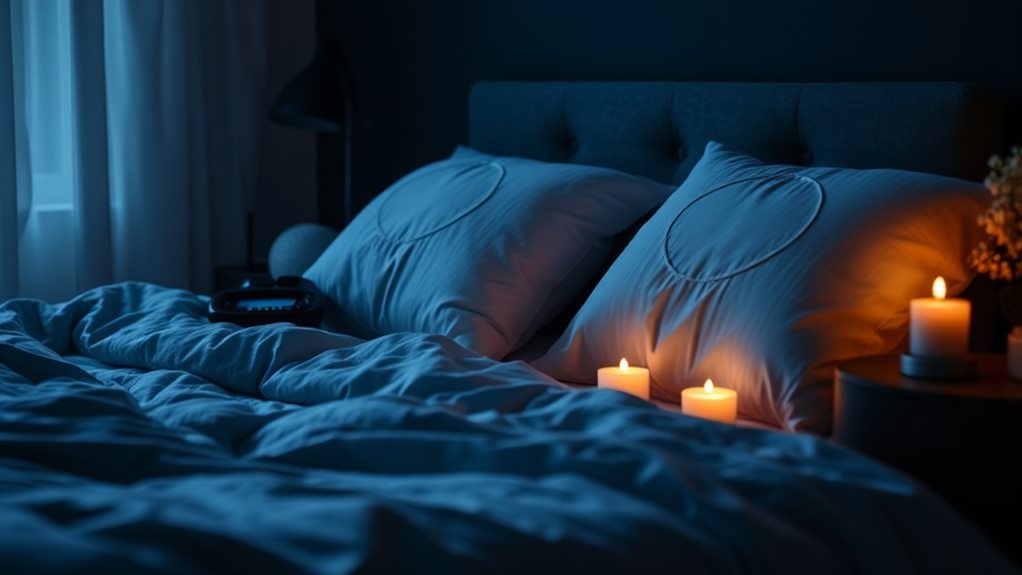
Numerous studies have shown that listening to calming music before bed can have a significant impact on the quality of your sleep.
By incorporating calming music into your bedtime routine, you can create a relaxing atmosphere that helps you unwind and prepares your body for sleep. You'll want to choose music that's soothing and calming, such as classical or nature sounds, and avoid anything with a fast tempo or jarring rhythms.
As you listen to calming music, you'll start to feel your muscles relax and your mind calm.
The stresses of the day will melt away, and you'll begin to feel drowsy. To get the most out of this technique, try to focus on the music and let go of any distracting thoughts. Close your eyes and allow yourself to fully immerse in the calming sounds.
Try Relaxation Techniques
Regularly practicing relaxation techniques can substantially enhance the quality of your sleep.
As you get ready for bed, your mind and body will benefit from a consistent calming pre-sleep routine. Relaxation techniques quiet your mind and release tension from your muscles, signaling your brain that it's time to sleep.
- Progressive Muscle Relaxation: You systematically tense and relax different muscle groups in your body, starting from your toes and moving up to your head, releasing physical tension as you go.
- Mindfulness Meditation: Focus on the present moment and observe your thoughts without judgment, often through gentle, slow breathing exercises or carefully guided meditations.
- Visualization: You imagine yourself in a peaceful, relaxing environment, like a calm beach or a forest, fully engaging all your senses to recreate the serenity and quiet you need for sleep.
When you integrate these techniques into your bedtime routine, you're teaching your body to recognize the cues for a restful night's sleep, making it easier to fall asleep and stay asleep.
Consistently practicing relaxation techniques before bed enables you to maintain a healthy sleep schedule and benefits your overall well-being.
Avoid Stimulating Activities

You've established a calming pre-sleep routine with relaxation techniques, but it's equally important to be mindful of activities that can undermine your sleep.
Engaging in stimulating activities before bedtime can make it difficult to fall asleep, so you need to identify and avoid them. For you, this might mean skipping a late-night workout or avoiding intense conversations with family members or friends.
It could also mean avoiding activities that get your creative juices flowing, such as painting, writing, or playing music. These stimulating activities can activate your brain's reward system, releasing feel-good chemicals like dopamine and endorphins.
While these chemicals can boost your mood and energy levels, they can also interfere with your sleep. By avoiding stimulating activities before bedtime, you can calm your mind and body, making it easier to fall asleep and stay asleep.
Take a closer look at your pre-sleep routine and identify any stimulating activities that might be undermining your sleep. Replace them with relaxing activities that promote sleep, and you'll be sleeping better in no time.
Limit Screen Time Before Bed
Wind down before bed by cutting back on screen time, as it can substantially disrupt your sleep.
You're exposed to screens throughout the day, so it's vital to disconnect before bedtime.
When you watch TV or scroll through your phone, you're stimulating your brain instead of relaxing it.
The blue light emitted by screens can suppress melatonin production, making it harder for you to fall asleep.
- Blue light exposure suppresses melatonin production: Melatonin regulates your sleep-wake cycle. Limiting screen time allows melatonin to do its job.
- Electronic devices stimulate your brain: TV shows and online content are designed to be engaging. Avoid the stimulating effect of screens for at least an hour before bedtime.
- Disruption of your natural sleep cycle: Exposure to screens too close to bedtime tricks your brain into staying awake, affecting the quality of your sleep. Establish a consistent sleep schedule and a pre-bedtime screen-free period to improve sleep quality.
Read a Book or Journal

As you cut back on screen time, replace it with a calming activity that signals your brain that it's time to sleep.
Reading a book or journal is a great way to unwind before bed. You'll not only escape into a good story or reflect on your day, but you'll also reduce mental stimulation and calm your mind.
Opt for a physical book or journal, as the blue light from e-readers and tablets can suppress melatonin production.
Choose a book that's not too engrossing or stimulating, such as a fiction novel or poetry collection.
Avoid non-fiction or self-help books that might keep your mind racing.
If journaling is more your thing, write down your thoughts, gratitudes, or reflections from the day.
This will help process your emotions and clear your mind.
Don't worry about grammar or spelling; just let your thoughts flow onto the page.
As you read or write, your eyelids will grow heavy, and you'll start to relax.
Create a Sleep-Conducive Environment
Transforming your bedroom into a sleep sanctuary is crucial for a restful night's sleep.
You spend about a third of your life in this room, so making it conducive to sleep is imperative.
A cluttered, noisy, and bright environment can keep you awake and alert, while a calm, quiet, and dark space can promote deep relaxation.
To create a sleep-friendly environment, consider the following essentials:
- Darkness: Use blackout curtains, blinds, or shades to block out any light that might creep in. You can also use an eye mask to cover your eyes.
- Quiet: Invest in earplugs, white noise machines, or a fan to mask any distracting sounds that might disturb your sleep.
- Comfort: Keep your bedroom at a comfortable temperature (around 60-67°F) and invest in a supportive mattress and pillows to promote relaxation and reduce stress.
Frequently Asked Questions
What Are the Underlying Causes of Insomnia and Sleep Disorders?
You're struggling to sleep, and it's not just about a poor bedtime routine.
The underlying causes of insomnia and sleep disorders are often more complex. You might be experiencing stress, anxiety, or depression, which can all disrupt your sleep patterns.
Or, you might be coping with physical issues like chronic pain, sleep apnea, or restless leg syndrome.
Identifying the root cause is key to overcoming insomnia and developing healthy sleep habits.
Can Insomnia Be Treated With Medication or Therapy Alone?
Imagine being one of the 30% of Americans who struggle with insomnia each year.
You're probably wondering if medication or therapy alone can cure your sleepless nights. While medication can provide temporary relief, it's often not a long-term solution.
Therapy, on the other hand, can help you address underlying issues, but it may not completely eliminate insomnia.
You'll likely need a combination of both, plus lifestyle changes, to truly overcome insomnia.
How Does Sleep Environment Affect Mental Health and Insomnia?
You're probably wondering how your sleep environment affects your mental health and insomnia.
Well, you create a sleep-conducive environment, you calm your mind and body, reducing stress and anxiety that can trigger insomnia.
A clutter-free, dark, quiet, and cool bedroom helps you relax, making it easier to fall asleep and stay asleep.
Are There Any Risks Associated With Using Sleep Apps and Devices?
You're literally glued to your sleep app, relying on it to lull you into dreamland every night.
But, beware! Using sleep apps and devices can be a double-edged sword.
You risk becoming too dependent on them, making it harder to fall asleep without them.
Furthermore, the blue light emitted from screens can suppress melatonin production, making insomnia worse.
Can Sleep Disorders Be Caused by Genetics or Family History?
You're probably wondering if your family history plays a role in your sleep struggles.
Yes, sleep disorders can be caused by genetics or family history. You're more likely to experience insomnia or other sleep disorders if your parents or grandparents did.
Research suggests that genetics can affect your sleep duration, quality, and rhythm. So, if you're struggling to sleep, it's crucial to ponder your family's sleep history and talk to a healthcare professional about potential genetic factors.
Conclusion
As you wind down with this relaxing bedtime routine, remember that consistency is key. By sticking to this calming pre-sleep ritual, you'll be sleeping like a baby in no time. Just like a musician tuning their instrument, you're fine-tuning your body for a restful night's sleep. In fact, a study by the National Sleep Foundation found that a consistent bedtime routine can improve sleep quality by up to 50%. Make it a habit and start sleeping better tonight.



